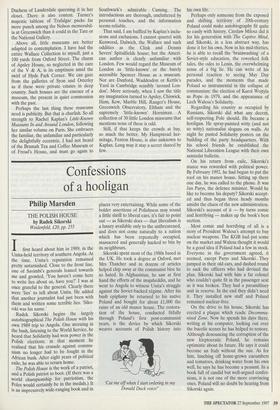Confessions of a hooligan
Philip Marsden
THE POLISH HOUSE by Radek Sikorski Weidenfeld, £20, pp. 255 Ifirst heard about him in 1989, in the Unita-held territory of southern Angola. At the time, Unita's reputation remained pretty untarnished. Close to the front line, one of Savimbi's generals leaned towards me and growled, 'You haven't come here to write lies about us, have you?' I was at once grateful to the general. Clearly there were 'lies' to tell about Unita. He added that another journalist had just been with them and written some terrible lies. `Siko- rski was his name.'
Radek Sikorski begins the largely autobiographical The Polish House with his own 1989 trip to Angola. One morning in the bush, listening to the World Service, he heard that Solidarity had won power in the Polish elections; in that moment he realised that his crusade against commu- nism no longer had to be fought in the African bush. After eight years of political exile, he was able to return home. The Polish House is the work of a patriot, and a Polish patriot to boot. (If there was a world championship for patriotism, the Poles would certainly be in the medals.) It is an impressively wide-ranging book and in places very entertaining. While some of the bolder assertions of Polishness may sound a little shrill to liberal ears, it's fair to point out — as Sikorski does — that liberalism is a luxury available only to the unthreatened, and does not come naturally to a nation which has been repeatedly occupied, massacred and generally hacked to bits by its neighbours.
Sikorski spent most of the 1980s based in the UK. He took a degree at Oxford, met Mrs Thatcher and in dozens of articles helped chip away at the communist bloc he so hated. In Afghanistan, he saw at first hand the efforts of the mujaheddin, and he went to Angola to witness Unita's struggle against the Soviet-backed regime. After his bush epiphany he returned to his native Poland and bought for about £1,000 the ruins of an old manor house. The restora- tion of the house, conducted fitfully through Poland's first post-communist years, is the device by which Sikorski weaves accounts of Polish history into `Cut me off when I start ordering in my Donald Duck voice!' his own life.
Perhaps only someone from the exposed and shifting territory of 20th-century Poland could make autobiography fit quite so easily with history. Czeslaw Milosz did it for his generation with The Captive Mind, and Sikorski, in a less abstract way, has done it for his own. Now in his mid-thirties, he is able to recall the 'brainwashing' of a Soviet-style education, the reworked folk tales, the odes to Lenin, the overwhelming sense of a big lie. He can write of his personal reaction to seeing May Day parades, and the moments that made Poland so instrumental in the collapse of communism: the election of Karol Wojtyla as Pope in 1979, and the appearance of Lech Walesa's Solidarity.
Regarding his country as occupied by Russians, Sikorski did what any decent, self-respecting Pole should. He became a hooligan. He spray-painted witty (and not so witty) nationalist slogans on walls. At night he pasted Solidarity posters on the building of the party headquarters. With his school friends he established the National Liberation League with their own samizdat bulletin.
On his return from exile, Sikorski's stance was rewarded with political power. By February 1992, he had begun to put the roof on his manor house. Sitting up there one day, he was called to the phone. It was Jan Parys, the defence minister. Would he like to become his deputy? Sikorski accept- ed and thus began three heady months amidst the chaos of the new administration. Sikorski's account of it — by turns comic and horrifying — makes up the book's best section.
Most comic and horrifying of all is a story of President Walesa's attempt to buy nuclear weapons. The KGB had put some on the market and Walesa thought it would be a good idea if Poland had a few in stock. Everyone in the government agreed, it seemed, except Parys and Sikorski. They jumped in their old cars, and dashed round to sack the officers who had devised the plan. Sikorski had with him a fat colonel who couldn't quite fit in the passenger seat as it was broken. They had a paramilitary unit in reserve. In the end they didn't need it. They installed new staff and Poland remained nuclear-free.
On the drive to his house, Sikorski has erected a plaque which reads: Decommu- nised Zone. Now he spends his days there, writing at his computer, looking out over the bucolic scenes he has helped to restore. Although denouncing the corruption of the new kleptocratic Poland, he remains optimistic about its future. He says it could become an Italy without the sun. As for him, lunching off home-grown cucumbers and tomatoes, drinking water from his own well, he says he has become a peasant. In a book full of candid but well-argued confes- sions, it is not one of the more convincing ones. Poland will no doubt be hearing from Sikorski again.










































































 Previous page
Previous page